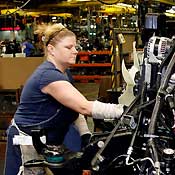There’s a Zen meal chant that says in part,
“This food comes from the efforts of many workers, past and present,
And its advantages give us health and well-being and promote strong practice.
Seventy-two laborers brought us this food; we should know how it comes to us.”

In honor of Labor Day, which takes place Monday, let’s pause for a moment to think about how much other people’s effort is involved in everything we do – food, transportation, sanitation, communication – and the real people who do that work. Thich Nhat Hanh writes about how the piece of paper his poem is written on contains the world, from the cashier who took money in exchange for the notebook to the workers at the paper mill, the loggers who cut the trees, back to those who breathed out the carbon dioxide the trees took in.
Be grateful to everyone.
The Buddha included right livelihood on the Eight Fold Path, his guidelines for living a life that will move one toward enlightenment. He laid out some very specific guidelines for acquiring wealth, which we’ll take as livelihood: it should be done legally; without violence, including threats and coercion; without deceit or trickery, and in ways that do not lead to the harm or suffering of others.
Livelihood is grouped with speech and action under the heading of sila, or ethics . “Buddhism, with its non-theistic framework, grounds its ethics not on the notion of obedience,but on harmony,” Bhikkhu Bodhi writes.
The Buddha elaborates on work, saying workers should do their jobs diligently; employers should treat their workers fairly; and any goods or services involved should be described honestly.
http://www.zimbio.com/pictures/WQzsd1RQwRM/GM+President+Michigan+Governor+Visit+Flint

In the spirit of awakening, of going beyond our concepts and cultural stereotypes, let’s turn to Philip Levine, named last month as the next poet laureate. The New York Times reported that he was selected from a long list of nominees by James Billington, the librarian of Congress, who called him “an extraordinary discovery because he introduced me to a whole new world I hadn’t connected to in poetry before.”
In “Coming Close,” it’s the workingwoman. Levine offers detailed observation of what it means to work on an assembly line.
Take this quiet woman, she has been
standing before a polishing wheel
for over three hours, and she lacks
twenty minutes before she can take
a lunch break. Is she a woman?
Consider the arms as they press
the long brass tube against the buffer,
they are striated along the triceps,
the three heads of which clearly show.
Consider the fine dusting of dark down
above the upper lip, and the beads
of sweat that run from under the red
kerchief across the brow and are wiped
away with a blackening wrist band
in one odd motion a child might make
to say No! No! You must come closer
to find out, you must hang your tie
and jacket in one of the lockers
in favor of a black smock, you must
be prepared to spend shift after shift
hauling off the metal trays of stock,
bowing first, knees bent for a purchase,
then lifting with a gasp, the first word
of tenderness between the two of you,
then you must bring new trays of dull
unpolished tubes. You must feed her,
as they say in the language of the place.
Make no mistake, the place has a language,
and if by some luck the power were cut,
the wheel slowed to a stop so that you
suddenly saw it was not a solid object
but so many separate bristles forming
in motion a perfect circle, she would turn
to you and say, "Why?" Not the old why
of why must I spend five nights a week?
Just, "Why?" Even if by some magic
you knew, you wouldn't dare speak
for fear of her laughter, which now
you have anyway as she places the five
tapering fingers of her filthy hand
on the arm of your white shirt to mark
you for your own, now and forever.
No comments:
Post a Comment